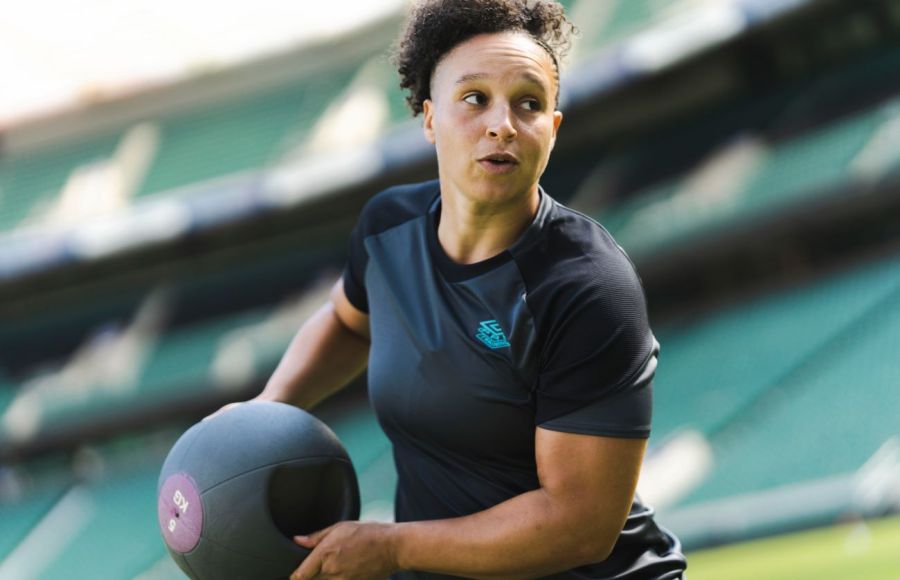Sportswomen are having a ball right now. Following the Lionesses’ historic victory in the UEFA Women’s Euro final in July, women’s sport has certainly entered a new era. We speak to five sportswomen who are breaking barriers and reaching new heights in their field…
Related: Shona McCallin MBE shares her hockey training secrets
This year’s UEFA Women’s Euros will hopefully deliver far more for women than one summer’s celebration of footballing success. It has highlighted just how far we have come in changing attitudes to women’s sport. Hailing the Lionesses’ Euros win as ‘a huge success in bringing women’s football into the spotlight’, former Man United defender Wes Brown is confident having female role models is a huge step forward in inspiring girls to take up sport.
‘Encouraging girls to play football is important not only for the game, but also for a boost to their mental health, fitness and confidence. And it’s about having fun, too,’ he told WF, from football camp Campioni Academy in Croatia, where he spent the summer coaching children’s football.
‘Encouraging girls to play football is vital for me as the benefits are huge,’ agrees 35-year-old sports presenter Karen Carney, a former England international player. ‘And if it makes them happy, then that emotion will enable them to grow in confidence both on and off the pitch.’
But the Women’s Euro win doesn’t stand alone in its success. Indeed, it has been a strong year for sportswomen breaking barriers in general, including weightlifter Emily Campbell’s and runner Eilish McColgan’s record-breaking performances at the 2022 Commonwealth Games, which saw the largest ever female sport programme in history.
It’s no wonder so many of us are feeling inspired. Wondering how to get involved in women’s sport? Five top female athletes offer their tips…
Related: Triathlete Kat Matthews shares her training advice
5 top sportswomen share their fitness tips
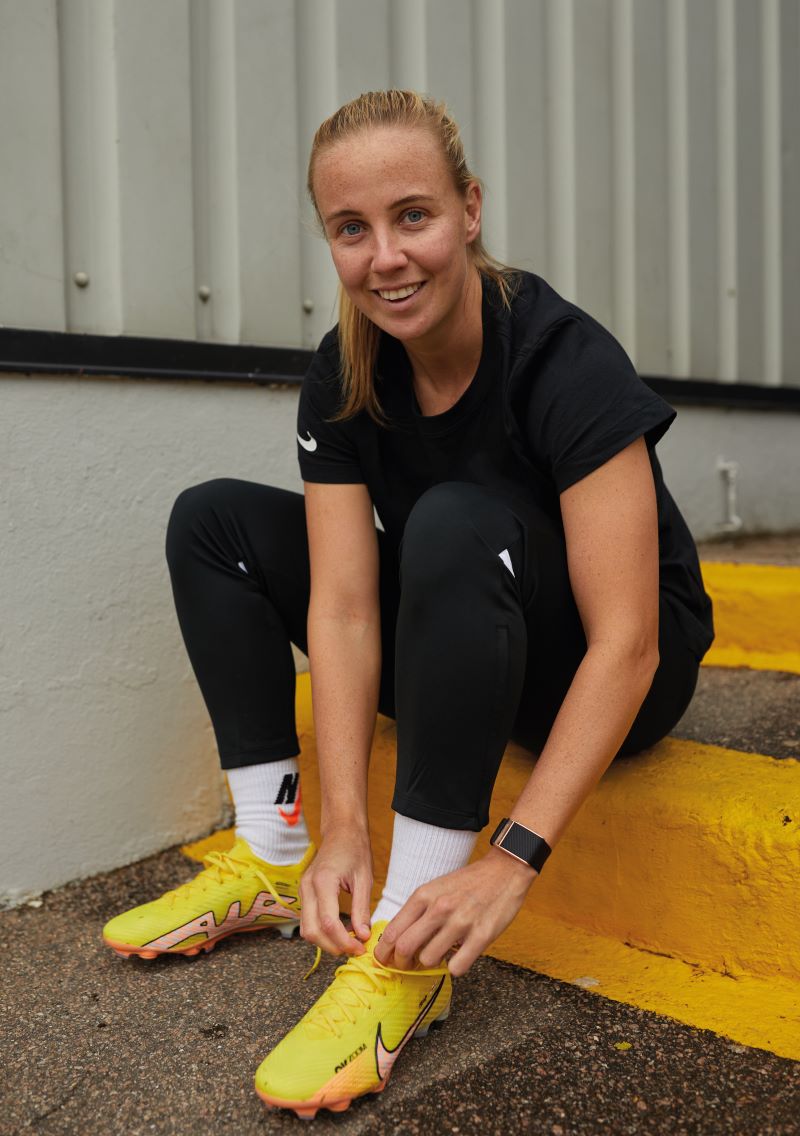
Beth Mead: ‘Always learn from your mistakes’
The England Lionesses’ historic Euro 2022 victory secured Beth Mead’s status as one of football’s brightest stars. Here, the 27-year-old forward tells us her training tips. After the Lionesses’ victory this summer, Beth Mead is still coming to terms with the historic win. Her dreams of ‘continuing to attract people to the women’s game’ are already taking shape, with record attendance figures witnessed at the North London Derby match in September, where Mead scored the opening goal.
‘There were 50,000 fans at the stadium and the energy they brought to the game was incredible,’ explains Mead. ‘I was subbed at 75 minutes and, as I walked around the pitch to get to the sidelines, every single person stood up and clapped. It was a goosebump moment; it felt totally surreal.’
Acknowledging that the public appetite for the women’s game is huge, Mead is determined now to ensure that it continues to grow. And in doing so, she is throwing herself into a number of initiatives, including working (as its ambassador) with McDonald’s Fun Football, which is offering 30,000 children free football coaching.
‘After the Lionesses’ victory this summer, Fun Football has seen a 60 per cent increase in girls signing up to the programme, which is amazing,’ adds Mead. ‘Seeing the smiles on the girls faces when they train, and knowing that we are helping ensure more children than ever before have the opportunity to play, is brilliant.’
With a new autobiography Lioness: My Journey to Glory (Seven Dials, £20) due out this month, Mead is keen to pass on her advice to youngsters. ‘It’s not a book all about my success story. It tells the raw truth about my journey, which had ups and downs just like everyone faces in real life.
‘Seeing the smiles on the girls faces when they train, and knowing that we are helping ensure more children than ever before have the opportunity to play, is brilliant.’ – Beth Mead
‘I want readers to know you can still follow your dreams, even when you face bad times. For example, when I didn’t get picked for the Olympics, I was gutted, but I learnt to pick myself up from the knock-back, and that helped me become a better player.’
As for her training tips, she has lots of advice – including the importance of sleep. ‘Everyone needs a good night’s rest to perform to their best ability,’ she says. And as an ambassador for the WHOOP fitness tracker, Mead is a firm believer in tracking your goals digitally to enable you to perform better.
In fact, when it comes to switching off from the pitch, Mead doesn’t find it hard to swap her boots for her slippers. ‘It is just as important to have some down time as it is to have a good night’s rest,’ she adds. ‘I’m lucky in that I’m good at zoning out. I absolutely love sitting on the sofa with a coffee and watching TV.’
And on the subject of television, we are keen to know whether Mead ever watches herself in reruns of matches. ‘My biggest advice to youngsters is to always learn from their mistakes, and that’s where I can rely on my parents! I don’t need to watch myself on the TV, as I know they will be there to tell me if I put a foot wrong on the pitch. If they are not at a live match, they definitely watch me on the television.’
Beth Mead is a WHOOP ambassador. For more information, visit whoop.com
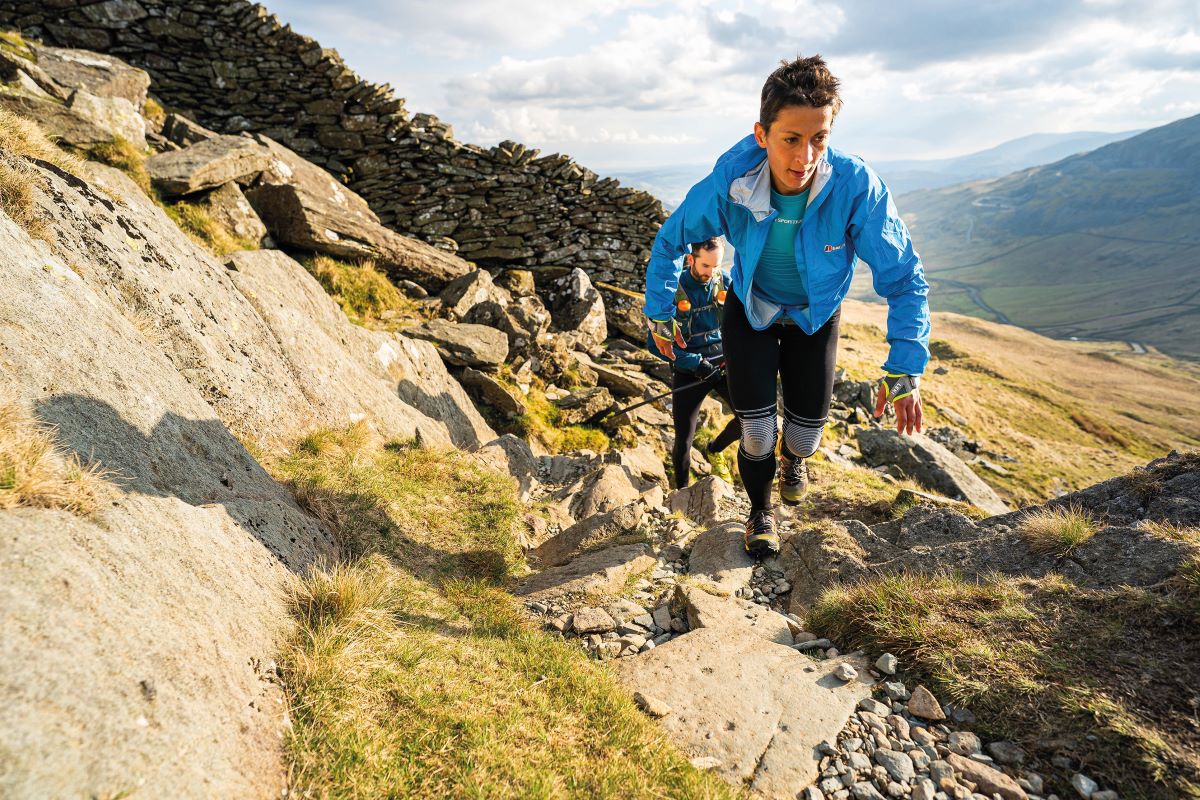
Sabrina Verjee: ‘Fear is the biggest barrier to success’
Ultrarunner Sabrina Verjee, 41, recently became overall record holder for the 325-mile circuit of the Wainwrights, breaking the men’s record by climbing all 214 fells in less than six days.
How did you get into your sport?
‘As a child I was hopeless, coming last at every sports day race. I didn’t really start running until my university years, when I was in the rowing squad and we did a one-hour run as part of our weekly training. Whilst at Cambridge University, I was introduced to adventure racing (a multi-sport team race). I competed in this sport for more than 10 years, travelling to lots of different countries and racing in many international teams. I would say that my attitude to “have a go” at pretty much anything opened a lot of doors for me.
‘At first, I was the slowest team member on foot in adventure racing, and I was better on the bike. I didn’t want to let my team mates down, so I was motivated to improve my skills in order to keep up. But by the end of my adventure racing career, I was definitely the strongest team member on foot stages (running/trekking/hiking). At this point, I decided to try ultrarunning. In 2014, I competed in my first ultrarunning event.’
What’s your sports highlight to date?
‘Probably breaking the record (which at that time was held by a man) for running all the Wainwrights summits in the Lake District that are featured in Alfred Wainwright’s pictorial guides.’
How do you train?
‘I run in the mountains and on the Lake District Fells. I am inspired to run by my adventurous mind and desire to explore nature.’
Is your sport more popular these days?
‘Ultrarunning is definitely gathering momentum. There are some big races on the continent and in the US. We are a bit behind here in the UK. However, I really enjoy the local races we have, and they are special because they are small and friendly.’
Any advice for women who want to try ultrarunning?
‘Don’t be afraid! Fear is the biggest barrier to success. It doesn’t matter if you fail. Those who don’t fail are not really challenging themselves. Ultrarunning is for everyone. Women have a natural toughness and aptitude for distance running, so build up your distance and give it a go. It is not necessary, or even possible, to run all of an ultra course – walking is perfectly acceptable. Ultras are about the journey, making friends and enjoying the beauty that nature has to offer.’
Sabrina Verjee’s top fitness tips:
- Get the kit: ‘Make sure your shoes fit well, you have clothes that don’t chafe, and a comfortable race vest or back pack.’
- Prepare mentally: ‘If you don’t feel like running, start slowly and ease in. Just get out and see what your body feels like doing. Then, if you want to run fast, go for it, and, if not, just potter along. I think it’s important to be in tune with what the mind and body wants and needs.’
Where There’s a Hill by Sabrina Verjee (Vertebrate Publishing; £12.99) is out now.
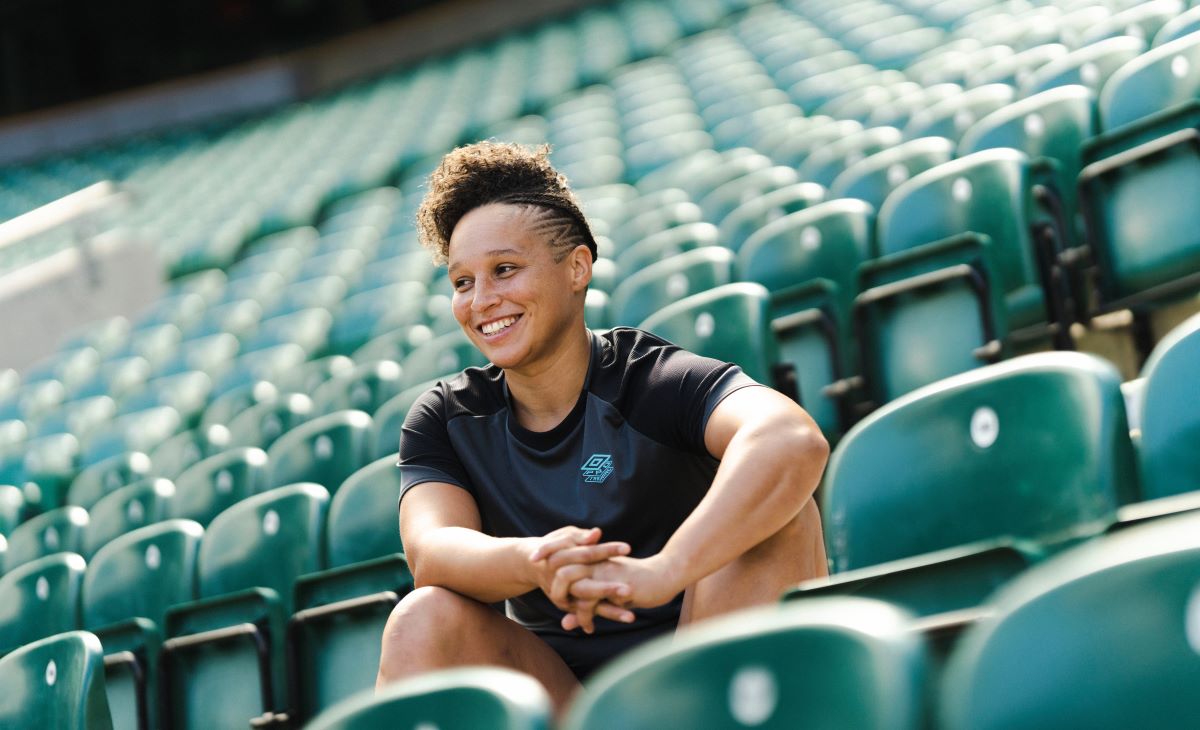
Shaunagh Brown: ‘Keep going and greatness will come’
Talking to WF as she readies for the Women’s Rugby World Cup 2022, 32-year-old Shaunagh Brown has her game face on. Part of the Red Roses squad (the England Rugby’s senior women’s team), Brown, an ambassador for Umbro, is ready to tackle the biggest match of her life.
How did you get into your sport?
‘I started playing at 25. I did athletics before that, which gave me a good foundation and made the transition to rugby a lot easier. I had a bit of a taster session and thought, “Rugby is for me”. Then, I went down to my local club at Medway and that was the start of it all.’
What has been your career highlight?
‘Winning the Allianz Premier 15s final with my club, Harlequins, and earning player of the match during that game. That resulted in me giving a bit of a speech during my post-match television interview, around women – not just in sport but women in general – and how we need to be taken seriously. That speech has been quoted so many times, and it makes me proud that I said it.’
How do you train?
‘Very hard. Rugby is a hard sport, no matter what elements you’re doing. There’s also a lot of contact sessions, scrummaging drills, lineout drills, lifting in the gym and running. I train differently with club and country. At club level, there is a restriction on time as not everyone is fully professional, but with England, we have a full schedule together.’
Is your sport more popular these days?
‘Our following and engagement on social media is going up. At certain events, someone will come up and ask for a picture. It’s a nice boost for me – realising what we are doing is working. My purpose is to get more women seen, and I’m seeing the results of that.’
What are your hopes for the future of the sport?
‘For it to keep growing. There are so many clubs without a women’s section. But the clubs, facilities and coaches are there – we just need to open the doors for girls to come and play.’
What advice would you give to girls looking to try the sport?
‘Just try it! If you think it’s right for you, go and do it. What’s the worst that can happen? Remember, you might not be great straight away but keep going and that will come. You’ll end up meeting so many different types of people and growing a friendship group.’
Shaunagh Brown’s top rugby tips:
- Muck in: ‘Take your own water! A lot of rugby clubs are not luxurious places – be prepared for a lot of mud and mess. Don’t worry about bringing boots; someone will always have a spare set. Put yourself out there, try different positions, don’t be pigeonholed by a coach.’
- Refuel fast: ‘Straight after a match it’s best to have a protein or meal-replacement, shake. I’ll take my own meal to a game for afterwards – something to get the calories in – but when I get home, I will usually have a cheat-type of meal. I’m partial to a Chinese takeaway.’
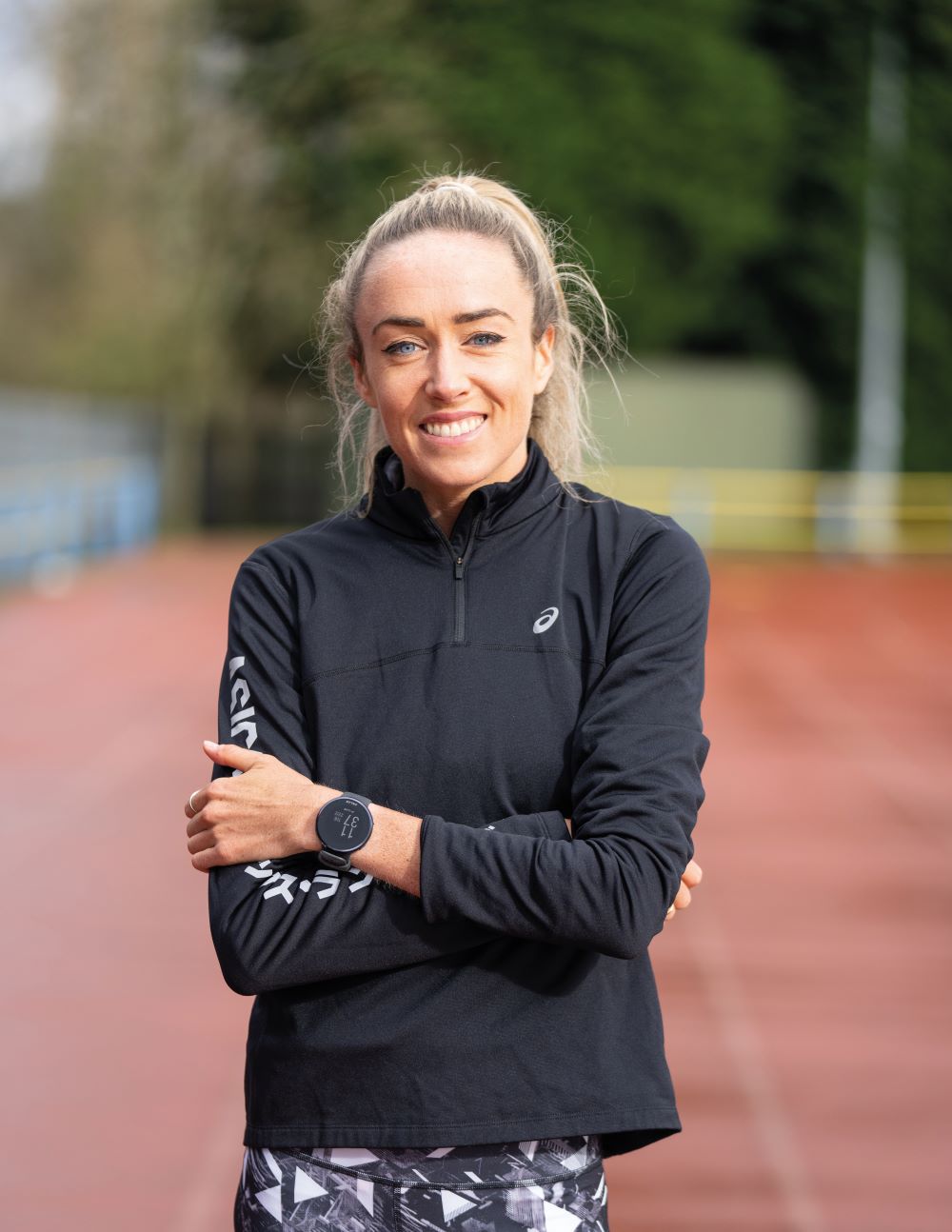
Eilish McColgan: ‘Try not to restrict yourself’
Three-times Olympian Eilish McColgan, 31, became the first British distance runner to compete in six championship outdoor finals in the same season this summer. Taking silver in the European Championships women’s 10,000m, and gold in the Commonwealth Games, the Polar ambassador also broke the British and European 10K records.
How did you find the frequency of Championships this season?
‘It was unusual. We wouldn’t normally have the World Championships, Commonwealth Games and European Championships all back-to-back, and that stat will probably never happen again unless there’s another global pandemic. For me, it was a “let’s just go for it and see how it pans out” situation, because you never know when you’ll get ill or pick up an injury. The World Champs didn’t pan out the way I wanted because I caught laryngitis, but I managed to bounce back for the Commonwealths. I’m glad I said yes to everything.’
How did you cope with that level of running output?
‘To be honest, it’s not been unusual for me to have a really hard session every three days this year, so that set me in good stead physically because I didn’t have any less than two days’ recovery between every competition. What I wasn’t prepared for was how mentally and emotionally challenging it would be, especially at the Commonwealth Games. It was the most special moment of my career so far.’
Why were the Commonwealth Games so overwhelming?
‘I hadn’t prepared for how big of an evening it would be for me, especially with my mum, dad and boyfriend in the stands. The roar from the crowds was insane after not having any spectators for two years! My priority was to cross the line and win a medal for Scotland for the first time, so I didn’t really think about my time. Taking a championship record that had stood for many years and winning that medal meant everything.’
Did you change your recovery strategy at all?
‘Getting enough recovery was very challenging, especially when competing at 10pm at the Commonwealth Games. By the time you get through drug testing, do your media interviews, arrive home, eat, have a massage and then an ice bath at 2am, it can be very hard to switch off afterwards, so I tried to sleep pretty much whenever I could. Fuelling myself well and going for easy runs to flush my legs out between competitions was also key.’
How do you bounce back after such a big season?
‘I always take a two-week holiday with my boyfriend every year in October to somewhere we’ve never been before. It’s a really important part of my year, and a chance to just mentally and physically reset.’
Eilish McColgan’s top fitness tips:
- Track your heart rate: ‘I monitor mine on easy runs using my Polar Vantage V2 watch (£429) to ensure that my heart rate stays low and I’m not pushing myself too hard. I also track my heart rate at night because having a high heart rate during sleep can mean you’re not recovering at all. Then, I try to take an extra rest day or sleep as much as I can.’
- Eat easy: ‘Don’t overthink your nutrition. As long as you’re getting some kind of protein, carbohydrates and good fats with every meal, you’ll be fine. Try not to restrict yourself and enjoy everything in moderation – including dessert!’
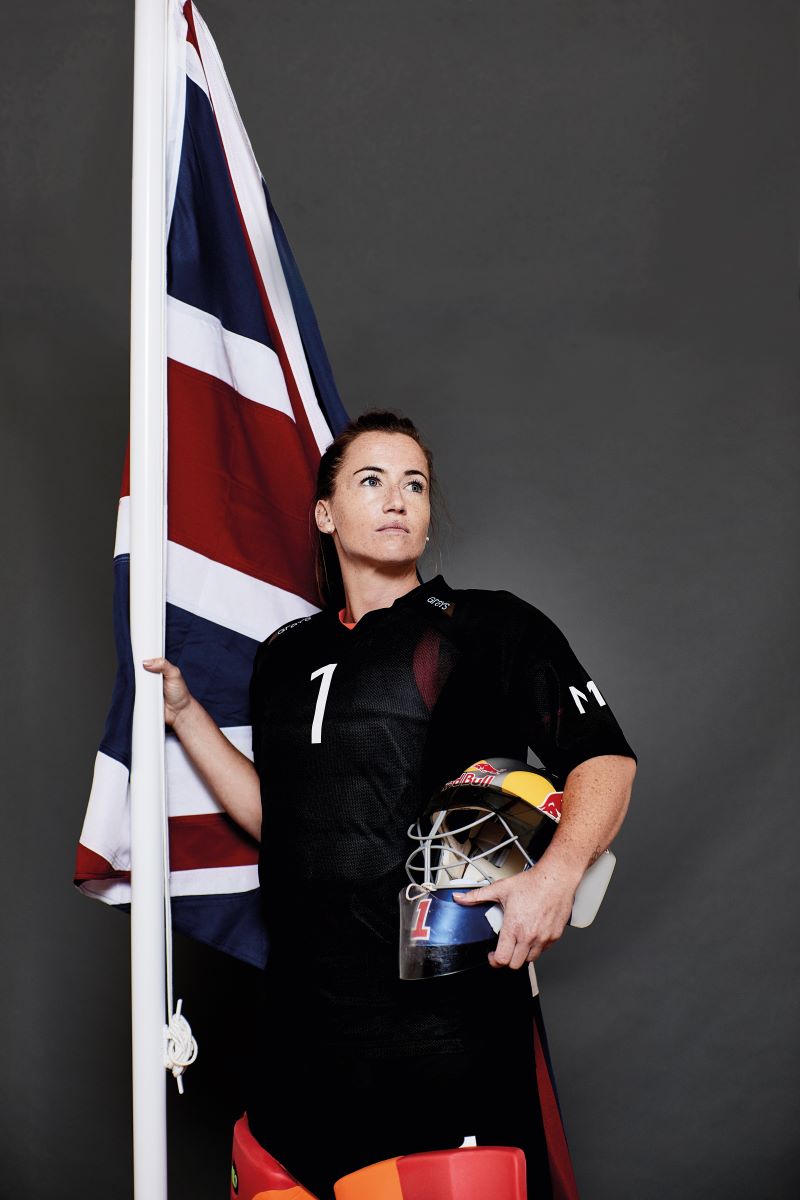
Maddie Hinch: ‘Confidence comes from the hours you put in’
Goalkeeper and Red Bull athlete Maddie Hinch was part of the Team England Women’s Hockey side that won gold at the Commonwealth Games. Having represented England and Great Britain more than 130 times, the 33-year-old also has several Olympic and European medals to her name.
How does it feel to have had such a long and successful career?
‘Tiring, especially as I don’t recover as well as I used to from either the matches or the parties afterwards. Medals epitomise years of hard work, and the days where I’ve had to dig deep to get a training session done. It’s been an incredible career and I don’t think I’ll really appreciate it until I call it a day and reflect back on it all, because when you’re in it, you’re just on-the-go 24/7, focusing on being the best version of yourself.’
What’s the secret to your sporting success?
‘The years of me chasing time on the pitch and in the gym as a younger athlete have allowed me to get to where I am. Confidence comes from the hours you put in, and you learn over the years that you can’t constantly do the same thing. You must adjust. My role in the team has changed, as has my mindset. Having the ability to block out the stuff going on in my head has taken a long time for me to work out. I’ll never be perfect, but I now know myself as an individual better than ever.’
What’s your greatest achievement?
‘I’m super proud of myself for coming through a period where I lost my love for hockey and struggled with depression. I’ve spent a while working on allowing myself to be a little bit more in the moment, and this is the first time in my 13-year career as a number one where I think I’m very content with just being and playing, trusting in myself and not having a “have-to-deliver” attitude.’
How did you rediscover your motivation?
‘By resetting my goals and what gives me energy. When you win the ultimate prize at 27, it can be intoxicating, and you want to chase that feeling again. But there’s the other side of it, where you wonder what’s next. That’s where resetting your goals comes in. I now put a lot of my energy into trying to inspire the team to want to achieve what I have, and this gives me a huge amount of energy to train.’
Maddie Hinch’s top fitness tips:
- Be consistent: ‘If you want to achieve your fitness goals, you’ve got to have consistent habits. Be willing to start with the very little things, from what time you wake up to the first thing you do when you get out of bed.’
- Invest in you: ‘In the latter part of my career, I promised myself I’d give more time to friends and family because it gives me energy back. I made a “priority pie” for which I broke up the things that are important to me. I look at it most days because, if I don’t, my whole day can become dominated by hockey. Everyone should take the time to visually prioritise what’s important to them.’
To find out more about Maddie Hinch, head to her Red Bull athlete profile page: redbull.com/gb-en/athlete/maddie-hinch
Words: Suzanne Baum & Joanna Ebsworth

